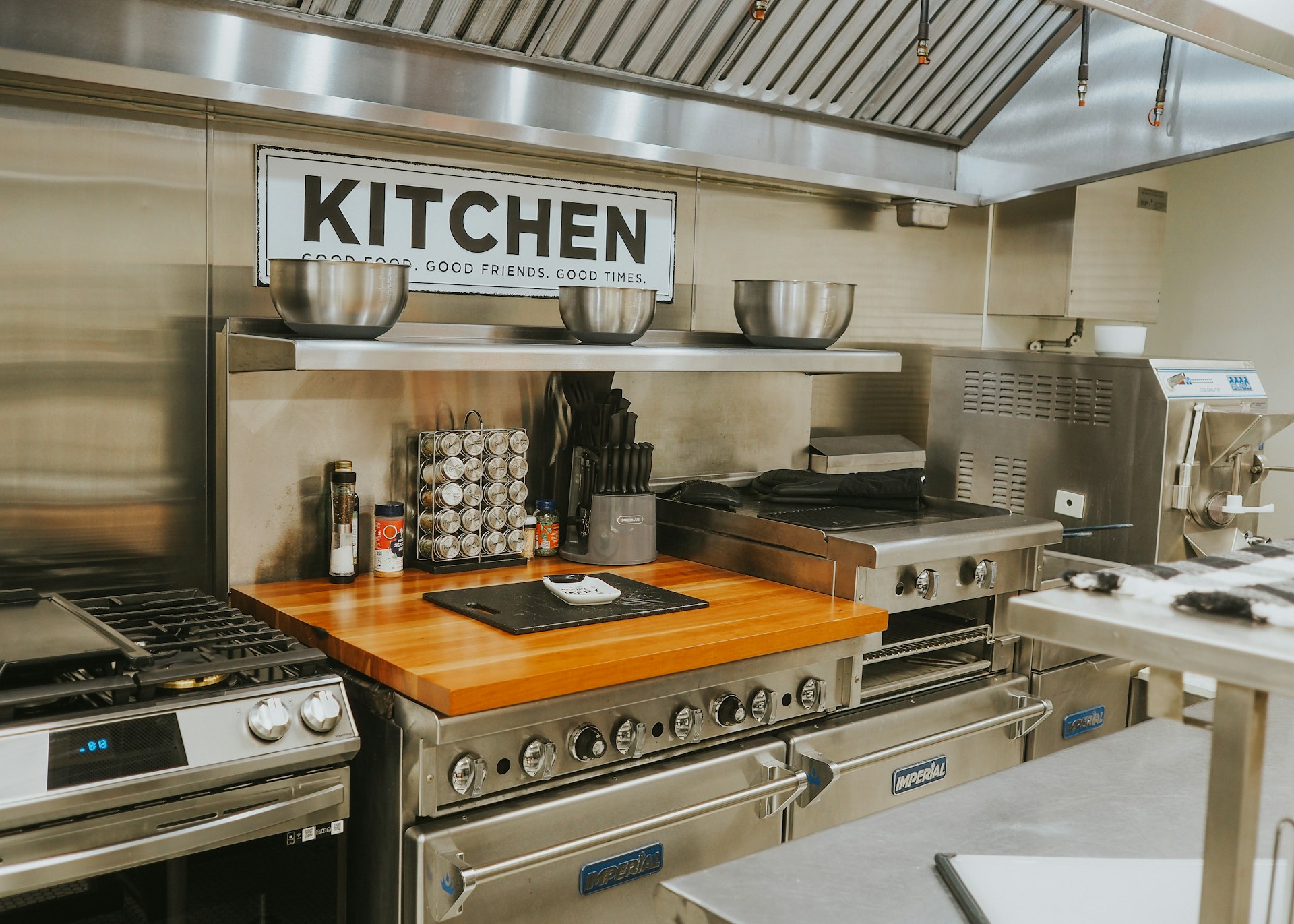Transforming Food Prep: How Smart Kitchen Technology is Shaping the Modern Kitchen


Photo by Barbara Burgess on Unsplash
Introduction: The Evolution of Kitchen Technology
The kitchen has always been at the heart of the home and the food service industry, but recent advances are reshaping how we cook, store, and manage food. Smart kitchen technology integrates automation, data analytics, and connected appliances to increase efficiency, improve food quality, and reduce waste. Whether at home or in a commercial setting, these innovations are rapidly becoming essential for anyone seeking to streamline food preparation and optimize their kitchen workflow [1] .
What is Smart Kitchen Technology?
Smart kitchen technology refers to the use of Internet of Things (IoT), artificial intelligence (AI), and connected devices to automate and enhance various kitchen tasks. From ovens that adjust temperature automatically to refrigerators that track inventory and suggest recipes, these systems aim to reduce manual labor, minimize errors, and provide a more enjoyable cooking experience [2] .
Key Benefits of Smart Kitchen Integration
1. Automation and Consistency : Automated grills, fryers, and ovens can follow pre-set programs to ensure food is cooked perfectly every time. This reduces human error and frees up time for more creative or value-added tasks [1] . In commercial kitchens, robotic arms can flip burgers or plate dishes, while at home, smart ovens adjust cooking times and temperatures based on the recipe selected [3] .
2. Enhanced Efficiency : Smart kitchen technology speeds up food prep and cooking. For example, connected ovens can preheat remotely, while voice assistants like Amazon Alexa or Google Assistant set timers, convert measurements, or walk users through recipes hands-free [2] . Advanced microwave ovens and induction cooktops further reduce preparation time [3] .
3. Food Waste Reduction : AI-powered inventory systems monitor stock levels, suggest shopping lists, and even automate restocking by linking with suppliers. Smart refrigerators alert you to expiry dates and recommend meals based on ingredients you already have, reducing spoilage and unnecessary purchases [1] .
4. Energy and Cost Savings : Smart appliances like energy-efficient dishwashers and refrigerators use sensors to optimize cycles, minimize water and electricity use, and lower utility bills. By 2030, more than half of commercial kitchens are expected to feature some form of AI or IoT appliance, as the cost benefits become clearer [5] .
Core Smart Kitchen Technologies and How to Use Them
Smart Ovens : Many modern smart ovens feature built-in sensors that monitor the temperature and humidity to ensure perfect baking or roasting. Some models allow you to control them from your phone, set specific cooking programs, or receive notifications when your meal is ready. To implement: Research leading brands, consider your typical cooking needs, and look for models with remote access and recipe databases [2] .
Smart Refrigerators : These appliances do more than keep food cold. With internal cameras, you can check inventory remotely, while built-in touchscreens offer recipes based on what’s inside. To make the most of these features, regularly update your fridge’s inventory and explore meal suggestions to reduce waste [3] .
AI-Driven Inventory Management : For commercial kitchens in particular, software platforms tied to smart scales and storage units track ingredient usage and automate ordering. To adopt these systems, start by digitizing your inventory and integrating with supplier platforms that support automated restocking [1] .
Voice-Activated Assistants : Integrate devices like Amazon Alexa or Google Assistant for hands-free control of timers, reminders, and even compatible appliances. Set up routines that help with daily meal prep or check the status of your dishwasher or oven with a simple voice command [2] .

Photo by Surface on Unsplash
Smart Dishwashers : These save water and energy by detecting load size and soiling, and some can be started or monitored remotely. For implementation, choose a model compatible with your home’s smart ecosystem and set up notifications for maintenance needs [3] .
Real-World Examples and Case Studies
In the restaurant sector, major chains like McDonald’s have piloted smart fryers and ovens that reduce labor costs and ensure consistency, resulting in faster service and higher customer satisfaction [4] . For home users, smart ovens from brands such as June or Tovala allow busy families to prepare meals with minimal supervision, using step-by-step guidance and automated cooking cycles [2] .
Step-by-Step Guidance to Building Your Smart Kitchen
- Assess Your Needs : Consider your cooking habits, budget, and the most frequent kitchen tasks you’d like to automate or streamline.
- Research Compatible Devices : Check product reviews and compare features. Focus on appliances that can connect via Wi-Fi or Bluetooth and are compatible with your preferred voice assistant.
- Start Small : Begin with one or two key items, such as a smart oven or refrigerator. Use them daily to assess their impact on your workflow.
- Integrate Gradually : Expand your ecosystem with additional appliances, such as dishwashers, coffee makers, or inventory systems. Sync devices to allow centralized control through your smartphone or home hub.
- Train Household Members or Staff : Ensure everyone knows how to use the new technology safely and effectively. Review manufacturer guides and consider online tutorials for best practices.
If you are a business owner or chef, consider consulting with kitchen design professionals or industry associations for recommendations on commercial-grade smart appliances and software platforms.
Overcoming Challenges and Exploring Alternatives
While smart kitchen technology offers many advantages, some challenges may arise. Initial costs can be higher than traditional appliances, and integrating systems from different brands may present compatibility issues. To address these, prioritize devices from established manufacturers with strong customer support and regular software updates. For budget-conscious users, look for entry-level smart gadgets or retrofit kits that can add connectivity to existing appliances [3] .
For those unable to invest in new appliances, many smartphones and tablets offer apps that help with recipe suggestions, grocery tracking, and meal planning, offering a low-cost entry point to smarter food prep.
How to Access Smart Kitchen Resources and Services
If you’re interested in upgrading your kitchen, start by visiting appliance showrooms to experience smart devices firsthand. Online retailers and manufacturer websites offer detailed product specifications and user reviews. For commercial kitchens, industry publications and associations, such as the National Restaurant Association, provide guidance on best practices and new technologies. You can also search for local kitchen technology consultants or smart home integration specialists for personalized advice. When evaluating products, prioritize brands with a track record of reliability and customer service.
Key Takeaways
Smart kitchen technology is rapidly transforming how we prepare and manage food, offering increased efficiency, improved quality, and sustainable practices. Whether you’re a home cook seeking convenience or a restaurant professional aiming to boost productivity, these innovations provide actionable pathways to a smarter, more efficient kitchen. Begin by assessing your needs, researching compatible products, and seeking professional advice when necessary. Stay informed about new developments to ensure your kitchen remains at the cutting edge of technology.
References
- [1] Harlem World Magazine (2024). How Smart Kitchen Technology is Revolutionizing the Food Service Industry.
- [2] Cosmo Appliances (2024). How to Incorporate Smart Technology into Your Kitchen for Effortless Cooking.
- [3] Technistone Blog (2024). Smart Kitchens: How Modern Technology Is Changing the Way We Cook.
- [4] Restroworks (2024). The Ultimate Guide to Building a Smart Kitchen.
- [5] Hospitality Tech (2024). How Smart Kitchen Equipment is Revolutionizing Restaurant and Hotel Operations.






